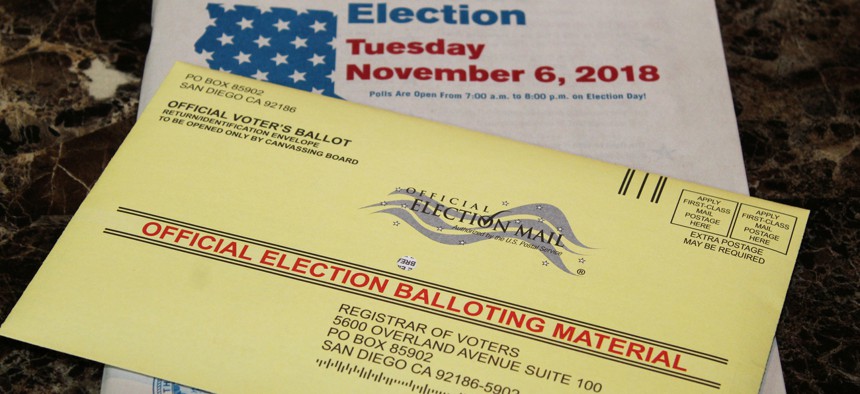
Rosamar/Shutterstock.com
Trump Denigrates Vote By Mail, But Troops Have Been Doing It For Decades
“Fraud is extremely rare in mail voting” says one expert, noting there are a number of security features associated with such ballots.
President Trump and other Republicans have alleged that voting by mail is not secure, but some election experts and former military officials say otherwise, noting that U.S. troops and civilians posted overseas have been doing it successfully for decades.
As the presidential election coincides with the novel coronavirus pandemic, many states have adopted vote-by-mail for their primaries and caucuses and support is growing among election officials to expand such efforts for the general election in November to heed social distancing guidance. Dr. Anthony Fauci, director of the National Institute of Allergy and Infectious Diseases and White House coronavirus task force member, said on CNN on Sunday, that he “can't guarantee” in-person voting will be possible or advisable in November due to the ongoing pandemic.
Meanwhile, the president has repeatedly railed against voting by mail, although he does acknowledge its value—for some citizens at least. “Absentee Ballots are a great way to vote for the many senior citizens, military, and others who can’t get to the polls on Election Day,” he tweeted on April 8. “These ballots are very different from 100% mail-in-voting, which is ‘RIPE for FRAUD,’ and shouldn’t be allowed!” A fact-check article by NBC News called the president’s comments misleading, and noted that “absentee voting is mail-in voting on a smaller scale, sometimes with different rules on who is allowed to take advantage of the accommodation.” Additionally, experts and former military officials pushed back on claims that voting by mail is not secure.
“It’s frankly disappointing to see any elected leader throw around these myths … because the evidence just doesn’t support that theory,” National Vote at Home Institute and Coalition CEO Amber McReynolds told Government Executive on Thursday. “There has been no evidence that military voters, or voters that have voted using the absentee ballot, have deliberately tried to defraud the system.”
Others agreed: “Millions of military voters have relied upon mail voting for decades, and I know of no allegations of fraud associated with those ballots,” Executive Director and Founder of the Center for Election Innovation and Research David Becker told Government Executive. “This is consistent with what Republican and Democratic election officials in states with high rates of mail voting have found—fraud is extremely rare in mail voting, as it is with in-person voting, and there are many security features on mail ballots (including signature matching and mail tracking, along with many others) that effectively prevent fraud and in those rare cases where it occurs, enables prosecution.”
In addition to election experts, former Defense Secretary Chuck Hagel told Task and Purpose he never saw fraud in the military’s voting system during his time in the Army or as a senator. “I never heard of any problems,” he said. “I never heard about any issues or anybody charging there was fraud, waste, or abuse in any process that involves voting absentee by mail.”
Following Trump’s comments, Retired Air Force Gen. Michael Hayden, who also led the Central Intelligence Agency and National Security Agency, tweeted that he voted by mail for 40 years. Also, retired Army General Barry McCaffrey tweeted, “Our military vote by mail out of state routinely. Paper ballots are the most secure mode of voting.”
Meghan Kelly, state legislative affairs specialist at the Federal Voting Assistance Program, said voting by mail “is a trusted resource for voters covered under the Uniformed and Overseas Citizens Absentee Voting Act … Military members, their families, and U.S. citizens residing overseas can use FVAP for support, assistance in completing the absentee voting process, or to simply answer any questions along the way.”
Preventing fraud is up to the state and local officials who run elections, Kelly said, but noted “professionals across the country take great care in ensuring fair elections.” The group, which for decades has been assisting military and overseas citizens with voting, works with the National Association of Secretaries of State’s Trusted Info 2020 campaign, “so voters will know they are receiving official and accurate absentee voting information when consulting FVAP materials.” Based on post-election surveys, FVAP estimated that 75% of the 1.3 million active duty military members are eligible to vote absentee under the act.
FVAP Director David Beirne, during an online event with the independent and bipartisan U.S. Election Assistance Commission on March 27, said that while “[the pandemic] is going to be extremely disruptive” the group is working with partners to anticipate potential problems and educate voters about what steps they should be taking to ensure their participation in the November election.
The $2.2 trillion CARES Act, enacted last month for coronavirus relief, allocated $400 million to help states prepare for and conduct elections during the 2020 cycle. Among other things, states can use their funds to expand absentee or vote-by-mail programs, according to the Election Assistance Commission.
“There have been exhaustive and expensive studies...many of them by partisan groups looking for voter fraud specifically,” said Maggie MacAlpine, co-founder of the election and technology firm Nordic Innovations Labs who was featured in HBO’s “Kill Chain” documentary on election security. “None of them have found any significant numbers.”
Image via Rosamar/Shutterstock.com







